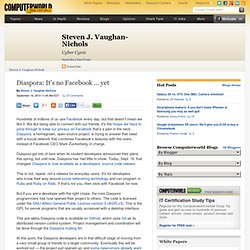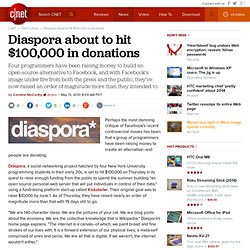

Co-Founder Dies Nov-12-2011. Hart said Zhitomirskiy's case is still at the active investigation stage by her office and that more information will be available when the case is closed.

When the case is closed the information we have regarding the case is a matter of public records, Hart said in a telephone interview. During the active investigation stage that information isn't available for release. Hart said the report will include their investigation, the autopsy result and the toxicology findings. However, it take several weeks to complete. Hart said Zhitomirskiy died on Nov. 12. The San Francisco police have confirmed his death but also didn't reveal a cause. Zhitomirskiy was a student at New York University's Courant Institute of Mathematical Sciences in 2010 when he and three other undergraduates decided to create a Web-based community that would give users control over the information they shared.
Diaspora: It's no Facebook ... yet. Hundreds of millions of us use Facebook every day, but that doesn't mean we like it.

We like being able to connect with our friends; it's the hoops we have to jump through to keep our privacy on Facebook that's a pain in the neck. Diaspora, a homegrown, open-source project, is trying to answer that need with a social network that combines Facebook's features with the users, instead of Facebook CEO Mark Zuckerberg, in charge. Diaspora got lots of fans when its student developers announced their plans this spring, but until now, Diaspora has had little to show. Today, Sept. 16, that changed. Diaspora is now available as a developers' source code release. This is not, repeat, not a release for everyday users. But if you are a developer with the right chops, the core Diaspora programmers has now opened their project to others.
This pre-alpha Diaspora code is available on GitHub, which uses Git as its distributed version control system. Diaspora, at this stage, is a distributed system. Diaspora about to hit $100,000 in donations. Perhaps the most damning critique of Facebook's recent controversial moves has been that a group of programmers have been raising money to create an alternative--and people are donating.

Diaspora, a social-networking project hatched by four New York University programming students in their early 20s, is set to hit $100,000 on Thursday in its quest to raise enough funding from the public to spend the summer building "an open source personal web server that will put individuals in control of their data," using a fundraising platform start-up called Kickstarter. Their original goal was to raise $10,000 by June 1. As of Thursday, they have raised nearly an order of magnitude more than that with 19 days still to go. "We are 140-character ideas. We are the pictures of your cat. Nowhere in Diaspora's language do its creators state explicitly that they're out to kill Facebook. The Making of Diaspora. Because most conversations on social networks happen nearly in real time, Diaspora's message distribution system must be as efficient as possible.

As you can imagine, a push system distributes messages more efficiently than a pull system, but it also makes a lot of demands on the server doing the pushing. The Diaspora guys are therefore trying out a new protocol being developed by Google engineers for dispersing public posts, which don't need to be encrypted and will likely be sent to more people than private posts. The protocol, named PubSubHubbub, calls for an intermediary server, or hub, and assigns it the task of handing out updates from a publishing server to its subscribers. Using a cloud-based hub, such as the one Google runs, lets you host data on your own small, cheap server while the hub takes care of publishing your updates for you. Last 15 September, as planned, the guys made their code public. And it just might look an awful lot like Google.